M.Phil Conversion to PhD (2024)
This research focuses on investigating approaches to teaching artwork interpretation in culturally and linguistically diverse (CALD) senior school visual arts classrooms:
- Proposal Development
- Methodology
- Milestones
Curtin School of Education Creative Education Research Hub offers HDR Supervision within the Doctor of Philosophy and Master of Philosophy education course streams which culminate in creative thesis examination (e.g., a major visual arts research exhibition and exegesis; or a major verbatim theatre performance work and exegesis).
Our Higher Degree by Research Community of Practice (CoP) meets online every month to share their work/journey and support one another through the various research journey phases (e.g., literature scoping, proposal development, milestone examinations, ethics applications, data management, arts-based analysis and results framing, conference presentations and creative thesis examination preparation).
Individual supervisory meetings are also regularly undertaken, and together the two initiatives provide excellent support for our HDR Arts-Based Education Research candidates.
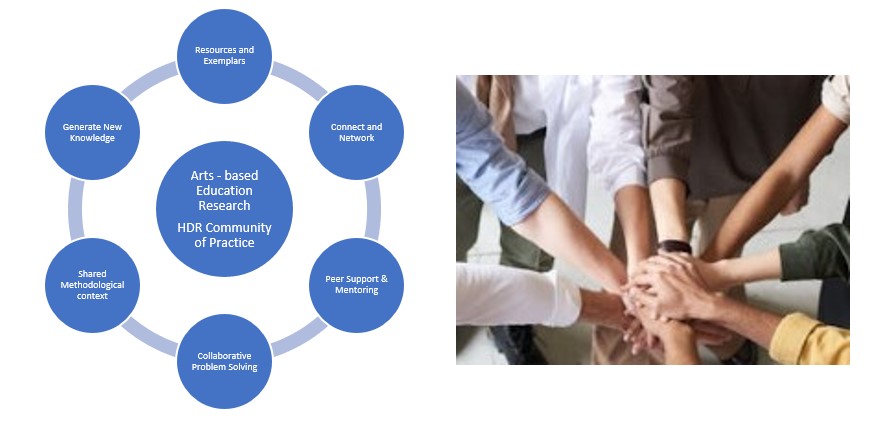
Our next HDR Creative Practice Research CoP meetings are:
NATIONAL/AARE: Wednesday 10th JULY 2024 @ 4.30WST via Teams (contact Assoc. Prof. Lisa Paris for the link to join this meeting: lisa.paris@curtin.edu.au)
LOCAL/CURTIN: Wednesday 14th AUGUST 2024 @ 4.30WST via Teams (contact Assoc. Prof. Lisa Paris for the link to join this meeting: lisa.paris@curtin.edu.au)
_________________________________________________________________
Praxis and Practice – supporting teacher wellbeing through (re)engagement with their personal arts practice

Supervisors: A/Prof. Lisa Paris and Dr Sonja Kuzich
Teachers who regularly engage in practice in their subject areas, feel authentic and more connected to their teaching and subsequently will be more likely to remain in their profession. This positive outcome is expected to flow on to improved student learning, also. Although teachers feel time poor, producing just one artwork per year can improve a teachers’ outlook and their vision of continuing as teachers and not feeling as though they want to leave the profession (Morris & Imms, 2019). This study will propose strategies to assist teachers to reconnect with their own creative processes and ultimately remain as teachers in the educational system.
Neuro-queering Curriculum for Neurodivergent Preservice Teachers in an Australian University
Supervisors: A/Prof Madeleine Dobson, A/Prof Lisa Paris and Dr Kathryne Ford

Neurodivergence, encompassing conditions like ASD, ADHD, dyslexia, and OCD, is
often viewed as a deficit needing correction. This study challenges this perspective,
arguing that struggles faced by neurodivergent individuals stem from systems that fail
to acknowledge or value their contributions.
The study employs queer theory and disability studies to challenge dominant
categorisation and identity boundaries, and the pathologising of identity. Both
theories centre the voices of marginalised people, a key approach in this research.
Drawing parallels between the queer and neurodivergent communities, both have
faced stigmatisation, marginalisation, and violence, leading to a resistance movement
advocating for positive identities, community, and societal changes. This process,
known as ‘neuroqueering’, has been acknowledged in art, social justice, and policy.
The current discourse on supporting neurodivergent students often prioritises rigid
categorisation, pathologising, and a focus on a cure. This study proposes
neuroqueering curriculum as a way to address key issues facing neurodivergent
students in higher education, including fluidity in identity, harm from dominant ways
of thinking, and the paradox of being invisible yet hypervisible.
The research employs a three-pronged approach:
An Exploration of the Effects of Extended Reality (XR) on Creativity in an Australian Secondary School Context
Supervisors: A/Prof Lisa Paris and Dr Martin Cooper
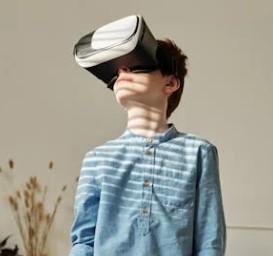
This research project will explore the effects of extended reality (XR), on creativity in a Western Australian (WA) secondary school. No research studies currently exist regarding this phenomenon in a WA secondary school context. One of the key ideas of the mandated WA curriculum is that students be exposed to various technologies and techniques to facilitate creative problem-solving (SCSA, n.d.). Given recent advancements in XR, which have made this technology viable and widespread in the creative industries, this technology aligns directly with this idea, making this a timely and useful study. Using the mixed-methods methodology (in an embedded multiple-case design) (Yin, 2009), the data collected will consist of semi-structured interviews, a questionnaire and scored artifacts produced by students and teachers to provide a rich and insightful overview of XR intervention in the classroom. This study will be important to educators interested in practical information about incorporating XR in the classroom and those seeking information on XR’s benefits in terms of creativity.
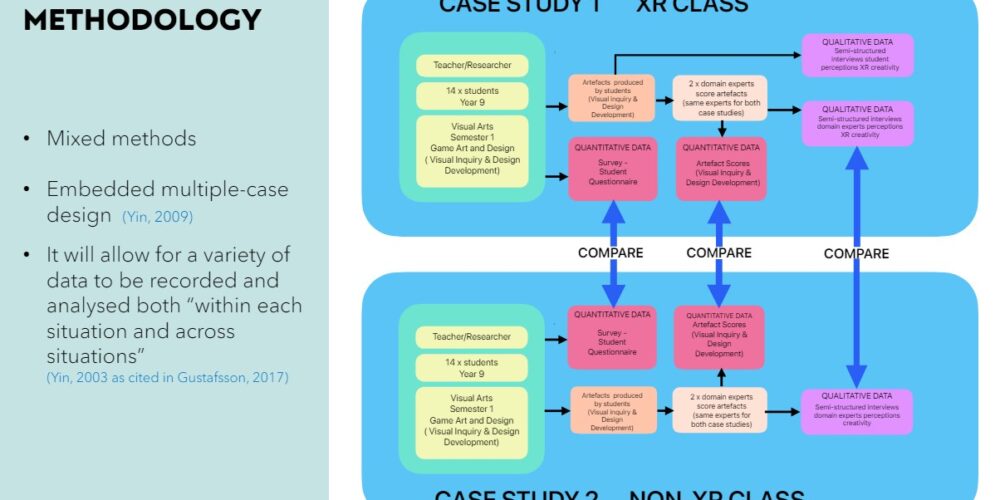
Best Art Education Practice of Working with Students with Disability in Australian Secondary Schools
Supervisors: A/Prof Lisa Paris and Dr Jia White
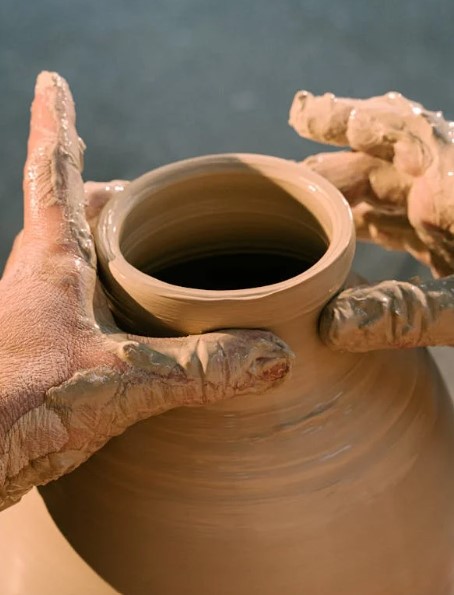
Current research suggests an entrenched, and fragmented approach to teaching students with disability (SWD), due to inadequate teacher training in practical methods and workable knowledge. Research has also shown a dichotomy between attitudes and discourse, subjective norms, and beliefs around SWD which is still overshadowed by the societal following of medical, social, and biopsychosocial models of disability. There are negative consequences for students who enter the visual arts classroom and encounter teachers with misconstrued perceptions of disability and diminished capability with respect to the provision of quality education practice. The proposed research responds to this problem and aims to engage with experienced secondary Visual Art teachers in Western Australia who will be asked to synthesise their professional knowledge around this problem; how working with SWD has varied over time and what they perceive as good practice for this group. This study will employ a qualitative, tri-paradigmatic framework in combination with arts-based methods because arts teachers have both crafted their models of practice with SWD and also because they are visually literate enabling richer data framing through visual strategies than words alone allow. Arts-based Education Research (ABER) is a participatory, non-traditional research practice that can capture discursive data from participants by virtue of rich visualisation strategies and dialogic exchange. The participants in this study are highly visually literate, enabling confirmation that the ABER visualisations of their experience are authentic and accurate.
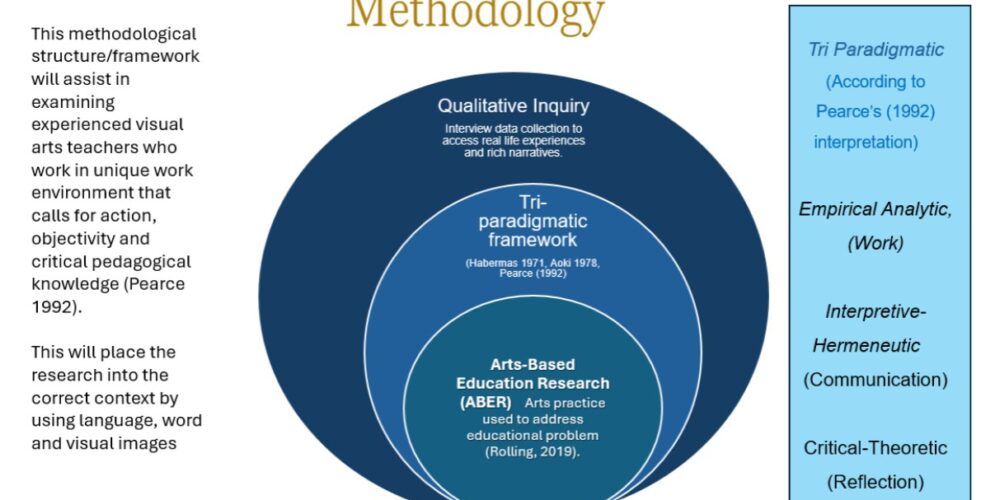
Something From My Garden: Arts-Based Enquiry into Collaborative Mentoring’s Impact on Early Career Arts Teachers
Supervisors: A/Prof Lisa Paris and Dr Carol Carter

The COVID-19 pandemic disrupted school learning and saw a range of new online mentoring approaches coalesce around the emergence of online groups. Post COVID-19 early career teacher (ECT) attrition rates, however, remain high, with early career arts teachers (ECATs) in particular having their own, distinct, stressors. This includes carrying heavy extracurricular responsibilities, from art clubs and camps,exhibitions and rotating displays through to external competitions for their student’s work and a myriad of art related ‘favours’ (often hundreds of hours of ‘personal time’ related to creative practice) (Paris et al, 2022, 429). Collaborative non-hierarchical mentorships have been shown to reduce stress and attrition rates among ECATs. Unfortunately, many teachers do not receive effective mentoring or even mentorsand there have been no formal collaborative non-hierarchical mentorships set up for ECATs post COVID19 in Western Australia (WA). Nor has there been arts-based educational research (ABER) into post COVID-19 experiences in arts mentorships. Working within an arts-based, social constructivist, interpretivist framework, I will set up a Facebook support group with ECATs and specialised arts teachers over 6 months. The experiences of the group will be recorded through observation and interviews and interpreted through art praxis. The resulting creative practice research exhibition of drawings, photographs, and paintings will explore, conceptualise, and present new understandings of participant experiences within mentoring relationships.
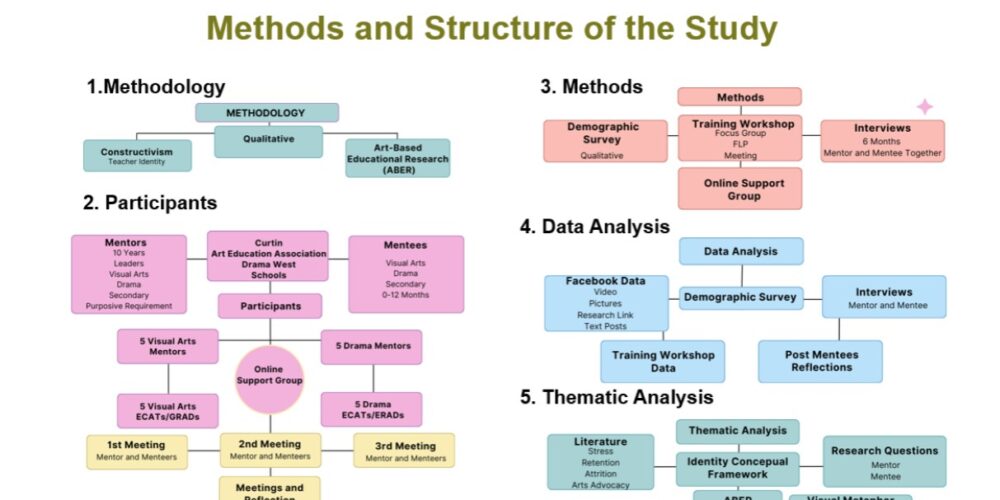
A Teacher Without Capability, The Kids Miss Out: Investigating Generalist Educators’
Perceptions of their Impact on Drama Teaching
Supervisors – Dr Carol Carter and A/Prof Lisa Paris
The proposed research seeks to investigate six Western Australian generalist educators’ narratives of classroom experiences teaching drama and their perceptions of the relationship between their capability to teach drama and students’ willingness to participate. This research employs an Arts-Based Education Research design to transform and express participants’ spoken words and my emic experiences as a specialist drama educator through a live ethnodrama performance. The ethnodrama will interweave our perceptual understandings of the research phenomenon into narrative vignettes and embodied phrases to address the current deficit in generalist educators’ capabilities to teach drama in Western Australian primary/secondary schools and its impact on students’ drama engagement.
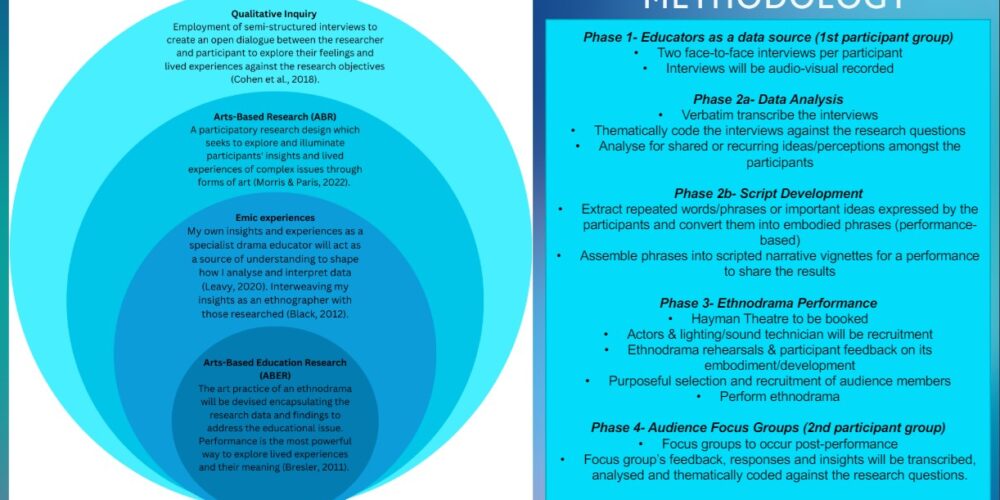
Supervisors – A/Prof Lisa Paris and Dr Carol Carter
Investigating approaches to teaching artwork interpretation in culturally and linguistically diverse senior school visual arts classrooms
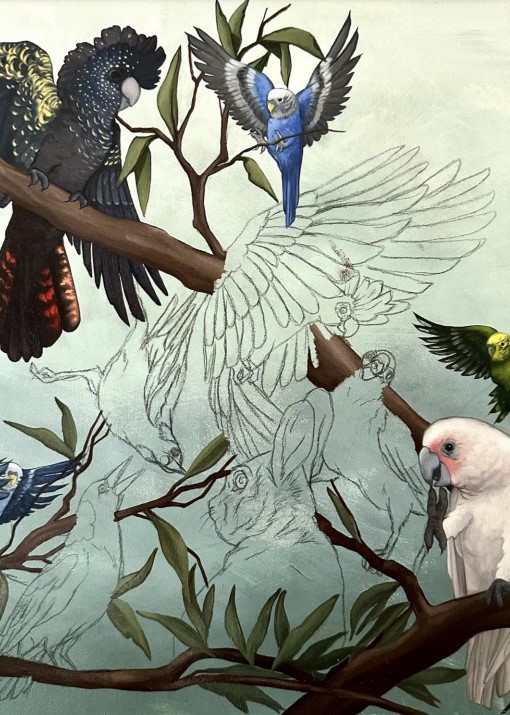
The proposed research seeks to investigate the struggles of culturally and linguistically diverse (CALD) learners enrolled in Western Australian senior school Visual Arts courses when tasked with the analysis of unfamiliar artworks in the Responding component of the course.
These challenges remain entrenched for CALD learners, as evidenced in the lack of research on successful strategies used to support these learners in their interpretation of culturally situated visual phenomena, such as the Western-European and Indigenous Australian artworks typically privileged for examination. Accordingly, this research aims to address these challenges by revealing effective strategies used by experienced visual arts educators working in CALD schools to support student acquisition of visual literacies and interpretive skills.
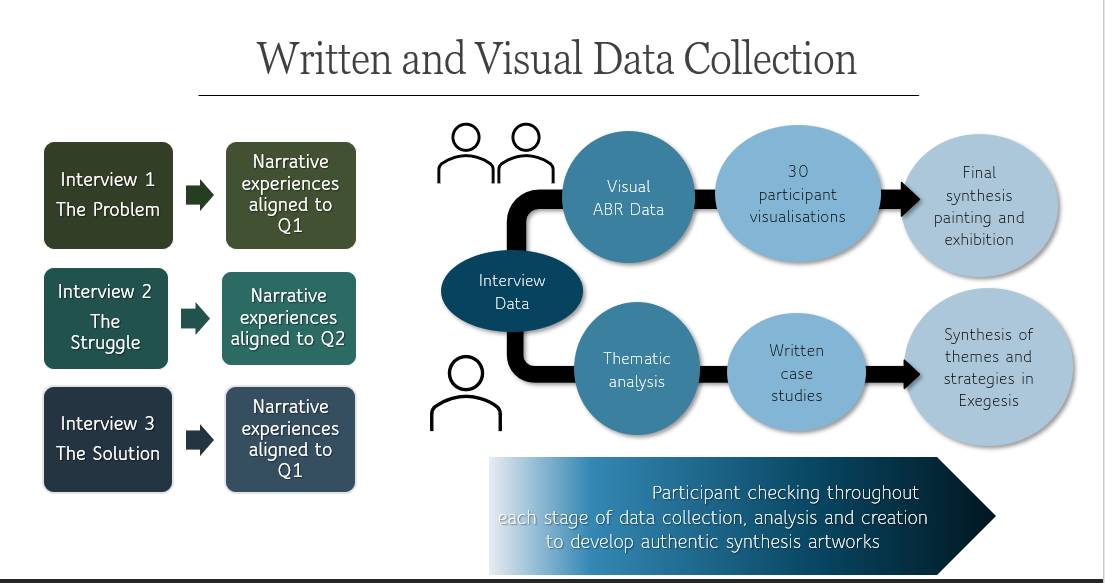
To reveal the rich insights of these experienced educators, a mixed-methods Arts-Based Education Research (ABER) design will be used to access discursive and visual data that captures their struggles and successes in navigating this educational issue. It is envisaged that this non-traditional research output will provide evocative insights into educator experiences and reveal workable strategies that other visual arts educators can learn from to better support CALD learner success in visual arts responding tasks.
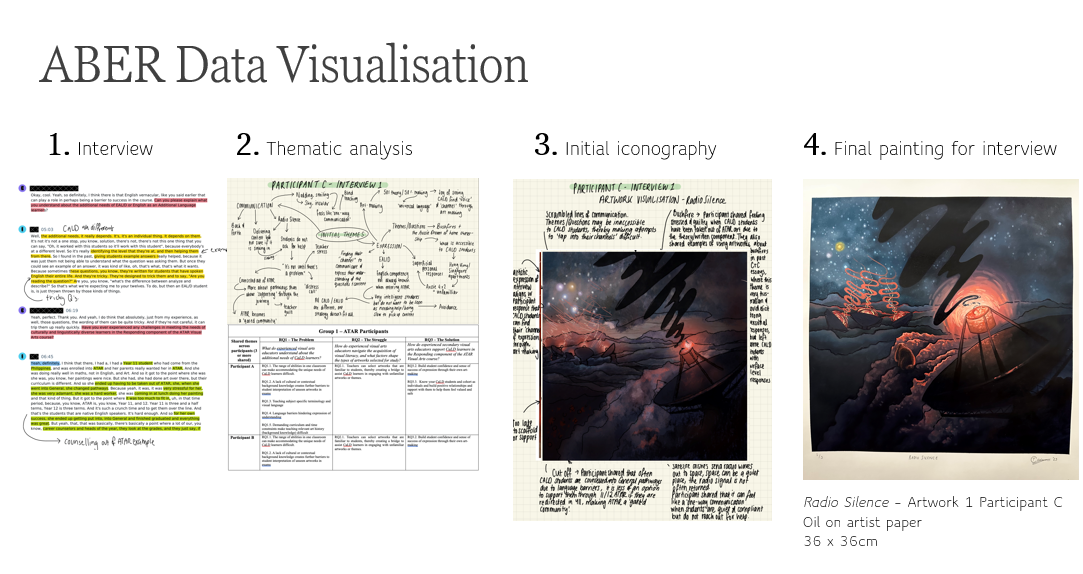
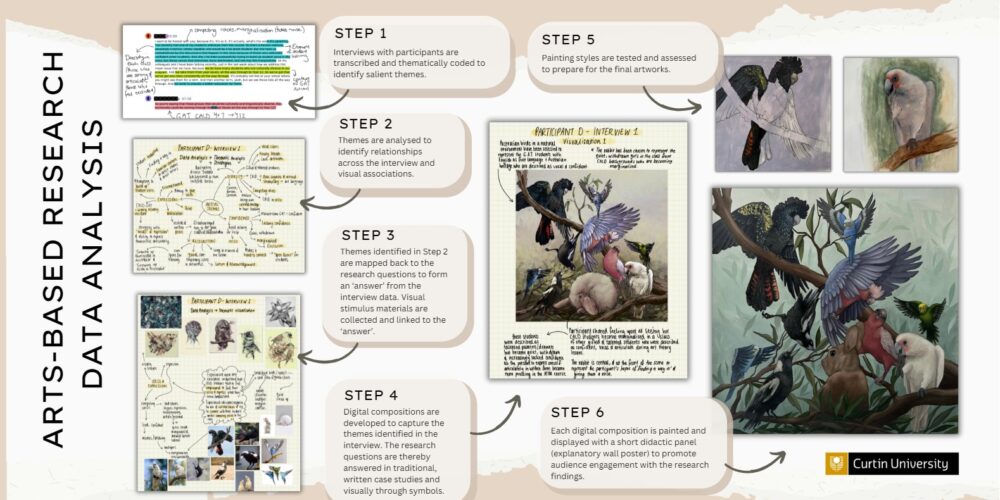
Read more about Tanya’s research
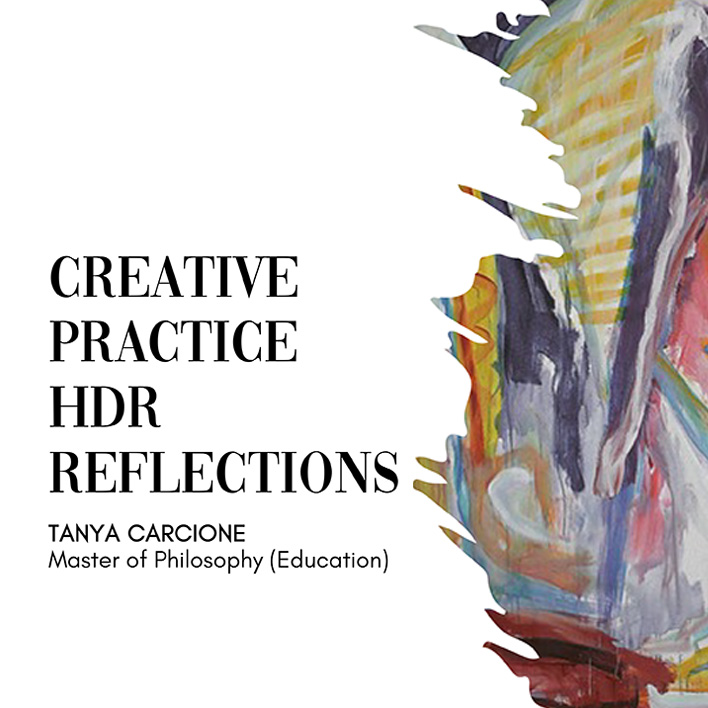
This research focuses on investigating approaches to teaching artwork interpretation in culturally and linguistically diverse (CALD) senior school visual arts classrooms: